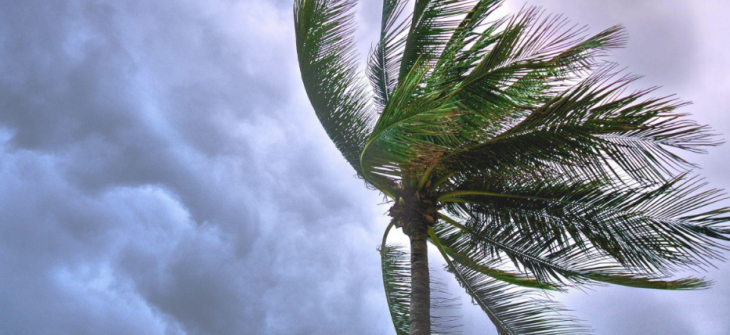Hurricane season in Florida is ramping up, and typically hits its peak in September. While we can never be sure of the kinds of storms we might see, there are plenty of things Floridians can do to be prepared for extreme weather. Here are three recommendations to help you be as ready as possible if (or when) a storm hits.
The SafeTouch Security System Advantage Wireless security systems are one of the most important items for people living in areas prone to hurricanes. The main reason being that wireless service provides less wiring and other
electronics which can be damaged or destroyed as the storm rages.
In addition to possibly less damage, you are also still able to access your security system while not being home, turn it off or on while away, and provide video recording of your home during the storm if your Wi-Fi stays stable enough.
Know What to Expect
Hurricane Basics
The first key to being ready for hurricane season is knowing some basic hurricane facts and terms. It’s important to note the three kinds of tropical cyclones, which are designated based on wind speed:
- tropical depression – a cyclone with sustained surface winds up to 38 mph
- tropical storm – a cyclone with sustained surface winds between 39 and 74 mph
- hurricane – a cyclone with sustained surface winds over to 75 mph
Though certainly not an exhaustive list, here are other frequently used words and definitions
that may come in handy in the next few months:
- extreme wind warning/advisory – sustained winds of 115+ mph, expected within an hour
- eye – center of the storm, with calmer conditions
- eye wall – area around the eye, with some of the most severe wind and precipitation
- hurricane warning – denotes that hurricane conditions in the area are expected
- hurricane watch – denotes that hurricane conditions in the area are possible
- landfall – the intersection of a storm’s center with a coastline
- rain bands – bands coming off the cyclone producing heavy rain, wind, and tornadoes
- storm surge – as a result landfall, a swell of ocean water that quickly floods coastal areas
- tropical storm warning – denotes that tropical storm conditions in the area are expected
- tropical storm watch – denotes that tropical storm conditions in the area are possible
These terms, and others, will come up a lot as you monitor news and weather reports for storm updates.
Hurricane Protocol
Knowing the difference between a tropical storm and a hurricane, or a storm warning versus a storm watch, will be a huge help. You will be better able to assess the danger and determine your and your family’s next moves.
In addition to knowing what each word means, it’s beneficial to know the timelines associated with them. The National Hurricane Center (NHC) will issue a watch if there is a possibility that a given area will experience tropical storm or hurricane conditions in the next 48 hours. In the event of a warning, the NHC’s issuance will indicate that a storm is expected in the given area within the next 36 hours. The NHC’s watch and warning protocols are there to allow time for taking precautions and, perhaps, making travel arrangements.
Depending on the forecast, you may decide to wait it out, or you might leave town early. You may even be ordered to evacuate. In the event of an extreme wind advisory, Floridians are encouraged to wait in the most interior room of the best shelter they can reach quickly.
Prepare for the Worst
Hurricane Kits
You can’t always count on the weather for a head’s up, so it’s a good idea to gather some essential items and set them aside. Keep the emergency must-haves in an easy-to-access bag (or bags) that can be moved easily. Assembling these kits can even be an activity for families to do together! Familiarize everyone with what’s inside; talk through and practice how to use age-appropriate emergency items. Many find that this activity has a calming effect for people
dealing with storm-related anxiety.
Knowing where everything is packed reminds people that there is a plan, and everyone can leave quickly should it become necessary. Below is a list of hurricane kit items, so you can be prepared ahead of time (and hopefully sleep more soundly):
● 1 gallon of drinking water per person/per day for 3-5 days.
(Extra water for food, pets, and personal hygiene).
● 3-5 day supply non-perishable packaged or canned food (including 3-5 day supply of
specialty items like formula, wipes, diapers, special foods, and toiletries).
● Manual can/bottle opener
● Toilet paper, paper towels, napkins and disposable utensils, plates, and bowls
● Unscented household bleach and medicine dropper
● Bedding (in case you evacuate)
● Clothing, including rain gear and sturdy shoes
● First aid kit, medicines/prescriptions
● Hand sanitizer and sanitizer wipes
● Flashlight(s) with extra batteries; backup power supply for phones
● Trash bags, resealable plastic bags, aluminum foil, and disposable aluminum pans
● Extra charcoal/propane fuel and fire extinguisher (outdoor cooking)
● Matches in a waterproof container
● Sunscreen, mosquito repellent with DEET
Add any other special items your family considers essential — like a walker, a favorite toy, or a stack of books. The internet is full of hurricane readiness guides and checklists, so there’s plenty to look at if you still need inspiration.
Plan Ahead
In the event of a hurricane, you know to expect power outages. Along with having prepared hurricane kits ready to go, there are a few important tasks that you can check off your list early to save time:
● Make sure you have a full gas tank
● Have extra cash on hand
● Charge your cell phone (and limit use after power is out)
● Fill bathtub and large containers with water for washing and flushing only.
● Freeze any food or drinking water if you expect a power outage.
Stay Updated with SafeTouch
Not every storm this season will be cause for evacuation. The tips outlined above are ways you can prepare when skies are clear. Having these things done now will give you peace of mind that whatever the hurricane season brings, you have a plan. That being said, things developvery quickly. It’s critical to stay on top of the weather forecast.
A large portion of Florida is situated on a coast. No matter where in the state you are, you’ll be impacted by this season’s weather. Hurricane forecasts are dynamic, so make sure you’re keeping up with the latest reports. Keep your cell phone charged, and keep an eye on news updates regarding evacuations or other storm developments. Having a remote security system can help keep the peace while dangerous situations arise.
Even in horrible weather conditions, we are here to help our customers. We have a dedicated storm team on duty during hurricanes to ensure there is no lapse in service. Contact SafeTouch today for a free quote and begin taking the steps towards safeguarding your home with a top-of-the-line security system.

